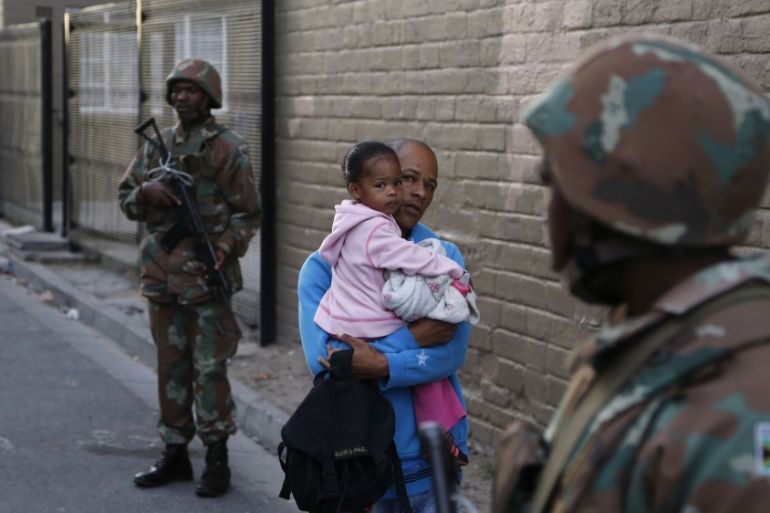South African military deployed in Cape Town to help fight gangs
Soldiers to help the police ‘restore law and maintain order’ in gang-hit parts of the port city for three months.

South African soldiers started patrolling crime-hit townships in the port city of Cape Town on Thursday under a government-ordered deployment to counter a surge in gang violence.
The South African National Defence Force (SANDF) troops are to remain on the streets of Cape Town and other parts of the Western Cape province for at least three months to boost a struggling local police force.
Keep reading
list of 4 itemsFrench police kill man suspected of setting fire to synagogue in Rouen
Colombia hunts for assailants after Bogota prison director shot dead
Texas governor Abbott pardons man who killed Black Lives Matter protester
The move – sanctioned by President Cyril Ramaphosa and in effect until October – was announced last Friday. The number of soldiers deployed was not revealed.
Ramaphosa told legislators the soldiers would support the police “to restore law and maintain order in communities that are being terrorised by gangsterism” and tackle “the most extreme incidents of violent crime”.
High levels of bloodshed this year in mainly poor majority-black and mixed-race areas prompted a provincial official last month to liken the situation in parts of the Western Cape province to a “warzone”, with some 2,000 people killed since January.
Communities in those districts often bear the brunt of violence spread over a vast area called the Cape Flats, where high rates of unemployment and drug abuse have increased gang activity.
Kader Jacobs, chairman of the Manenberg Community Policing Forum, which helps crime prevention in the working-class Manenberg suburb, told Reuters News Agency that troops had targeted houses and cordoned off some streets for more than an hour on Thursday.
“They did some raids with the anti-gang unit and the local police,” Jacobs said. “I think the people expected the army to be in the area at least between 8-12 hours, not a cameo visit of an hour and a half and off you go.”
But local residents in the Hanover Park township said they were pleased to see troops on the streets.
“When I first saw the army vans passing by, it was amazing because I saw the children with big smiles on their faces, dancing and singing that the army is here to save them,” Nadia Hopley, a 36-year-old unemployed mother of four, told the AFP news agency.
“The children can finally play freely without gunshots, I hope. Since the shootings have intensified, the local hospital closes in the evening and medical help is further away,” she added.
Theresa Jantjies, a 45-year-old who suffered head injuries when a bullet was fired through her shack two years ago, also expressed support for the deployment.
“It’s like we are living in jail and they are free. We must stand with the army to take our community back,” Jantjies told the AFP. “The gangs just shoot how they please.”
‘Unsustainable response’
Cape Town, an international tourist destination with stunning coastal and mountain scenery, has one of the highest murder rates in South Africa, according to police statistics.
The city has an entrenched gang culture, with thousands of young men belonging to street gangs with names like “Hard Living” and “Young Americans”.
Many wealthy people live in fortified homes with high walls topped with electrical wires, CCTV monitoring and armed guards.
The army was last deployed to tackle gangs in the city in 2017. Defence Minister Nosiviwe Mapisa-Nqakula suggested on Wednesday that the “exit strategy” for the current deployment would be determined by intelligence gathering
But analysts warned the move to send in troops in a bid to address the violence was not a lasting solution.
Gareth Newman, head of justice and violence prevention at the Pretoria-based Institute for Security Studies, last week called the deployment a “short-term, unsustainable response to a crisis”.
“When will we see clear plans to professionalise the police and prevent murder so there’s no need for the army?” he questioned in a Twitter post.
Last year, more than 20,000 people were murdered in South Africa – an average of 57 a day.